- Home
- Barry Unsworth
Land of Marvels Page 17
Land of Marvels Read online
Page 17
“You mean he believes he is a victim preordained, that the bomb is aimed at him?”
“Something like that. I don’t know how people get into that state, it’s a mystery of the psyche.”
Palmer reflected for a while. “I think you are probably right,” he said, much to her relief without animosity. “Right about me and about John. I hadn’t wanted to think along those lines because it amounts to saying that in his heart he actually wants to be wiped out, and that is slightly mad.”
“Not so much that he wants it, but he feels that it is certain to happen, that something has been set in motion that can only end in destruction, that it gathers pace whatever anyone can do and it’s coming straight for him. I don’t know if you would call it mad. A lot of people in Europe must be feeling like that these days.”
There was a look on her face now that Palmer recognized, combative, ready to deal with hecklers—her speechy look, as he called it to himself. He didn’t dislike it, it belonged to her, but it brought out a spirit of contradiction in him; he had a constitutional distrust of large statements. Patricia saw him screw up his mouth and narrow his eyes in an expression she was destined to see quite often. “I think you are piling it on a bit,” he said. “John Somerville as the soul of Europe?”
“You think it is far-fetched? Perhaps you are right. But John is a sensitive man, and it must be distressing to be living at a time when people like him—and like you too—people trying to put things together, make sense of things, add to the sense of human community, are facing a contrary spirit of dismemberment and destructiveness that is terribly strong and pervasive. It is a kind of brutality that goes under the name of realism, and it is alive and well in Britain. You can call it the spirit of commerce, or the spirit of empire, or the élan vital. At Cambridge I made a special study of the Whig administrations of the mid-nineteenth century and their dealings with Belgium and Russia, and what Lord Palmerston said during his time as Foreign Secretary has always stayed in my mind. I’ve forgotten a lot of the stuff but not that. ‘There are no longer permanent principles, only permanent interests, and we pursue these to the exclusion of all else.’ That’s more than half a century ago, but nothing has changed.”
Her face, which was normally pale, had flushed with the warmth of the fire and the force of her feelings. “Except that the politicians are more hypocritical now,” she said. “At least he was honest. I mean, a railway can serve permanent interests, but it is hard to see how archaeology can.”
“Unless a museum is a permanent interest,” Palmer said. “Must get to bed. Perhaps the first rays of tomorrow’s sun will bring some enlightenment. I love you, and that serves an interest that I hope will be permanent.”
Not much later, taciturn, unshaven, rather disheveled-looking, he was there by Somerville’s side at the summit of the mound. He had needed to be roused from sleep and he felt stupid and he was missing his morning coffee, which there had been no time for. And in this state of discomposure, which the walk there had done little to improve, his concern for Somerville found expression in feelings of irritation. He was fed up, he told himself, with these vagaries, with what seemed increasingly erratic behavior on the other’s part, the irregular hours he kept, his wanderings about the place, his nonappearance at meals, his frequent habit of raising his head as if listening to something, some distant sound. They were onto something here, Palmer knew that. These latest discoveries could lead to something really important. Already they had broken new ground; they would be able to demonstrate that this had been an Assyrian township, that the great king Esarhaddon had issued proclamations from here at the apex of Assyrian power. If they were given time to go on, if they were able to finish the season’s digging, more, much more, might be found. They should be getting on with it in proper order instead of standing here in the cold morning air waiting for some occult revelation.
He turned his head to look at his companion in a way that was deliberately interrogative, though without saying anything. The German railway buildings lay directly below them, still seeming half shrouded in night. There had been no unusual activity there of late, no sign that the track was imminently expected. After all, he reasoned, construction of the line had begun in 1903, and that was eleven years ago now. The work had been subject to long delays from the very beginning; surely they could expect to have three months more to work on the site. If more inscriptions of that degree of importance were found, and he was able to decipher them, he might make a name for himself here. All the same, he would be glad when the time came to return to England. Somerville was no longer a comfortable man to work with. And then there was Patricia; they were planning to marry in the autumn.
Still no words were exchanged between them. Somerville stood without moving, looking straight before him down the slope. We are like two devotees, Palmer thought, waiting for the sun god to give us a sign. Hereabouts Assyrian priests would have stood, waiting with their incantation to the sun. He had risen every day, all through their lives, yet still he needed to be begged to return once more and illuminate the life of mankind . . .
The light was changing, warming, though the sun was not yet visible, as if the sky were in a glow of expectation. This took on a brief ruddiness as the rim showed, then drained paler. Then there was no color at all, only a spreading brightness.
Utu in Babylonian; Shamash in Akkadian—it was under this name that the Assyrians would have prayed to him. Palmer remembered phrases from the Great Hymn to the sun god. Dispeller of darkness, brightener of gloom, all monsters of the deep behold his light.
“There,” Somerville said loudly. He pointed down the slope. “I knew it.” There was exultation in his voice. “Down there, where the ground levels.”
Palmer looked where the finger pointed and saw a shape roughly circular, four or five feet in diameter, perceptibly darker than the surrounding earth, as if still retaining some damp of night.
“You go down,” Somerville said urgently. “I’ll stay up here and keep it in view. You won’t see it from close, but I’ll give you directions from here. Put a pile of gravel or small stones, anything you can get hold of, in the center. We’ll have to be quick, we only have about ten minutes.”
Palmer did as instructed. He could see nothing when he got down there. The circular shape had vanished completely; the earth was one indeterminate yellow-brown, caked with drought. He looked up to where Somerville stood above him, on the summit, shouting already. He strained his ears to listen.
“Come forward towards me,” Somerville shouted. “About six paces. Six paces. Good God, what kind of paces are those? Now a little to your right. To your right, man, directly to your right. Stop!” He held up his right arm like a policeman stopping traffic. “You’re there,” he shouted. “Mark the spot.”
By the time Palmer had made a pyramid of stones and retraced his steps to the summit the outlines of the shape were no longer so clear. And in the succeeding minutes they disappeared altogether, leaving the two of them looking down at a small heap of stones.
“We must set a guard there,” Somerville said. “We must make sure no one displaces the stones before we can get to work.”
“Get to work? How do you mean? It might be accidental. The circle is a shape you find in nature. A subsidence of the ground, some operation of water below the surface—”
“It is only when the sun’s rays fall at a certain angle. And then only for a few minutes. At all other times the ground looks entirely uniform. What shape in nature would behave like that?”
“I don’t understand what makes it visible at all, I mean ever. Why does the earth inside the circle look darker?”
“They must have gone straight down, through everything in their way.”
In this early sunshine Somerville did not look at all well. His face had thinned over these recent days, his eyes seemed deeper in his head and had an unusual fixity of expression. Doubts about his chief’s state of mind returned to Palmer. “Who do you mean?” he said.
>
“The people doing the digging. Somewhere below they had to go through rock. They would have used baskets to pass the chips and splinters up to the surface as they went deeper, just as we do now. Then, when they filled up the pit again, some of this rock stuff must have been left round the mouth.”
“I still don’t see—”
“The stone from underground would have been darker. After three millennia, in spite of the weathering, it is still darker. Very slightly, of course, but the rays of the sun, when they fall at a certain angle, bring out the darker tint.” Somerville paused for a moment and when he spoke again it seemed with a conscious effort to keep his voice dispassionate. “I can think of only one reason why people should want to dig vertically down like that. What we are looking at is the mouth of a tomb shaft.”
On the evening before he left Jerablus for Tell Erdek, his great idea grown more compelling and brilliant, irresistible, as he hoped, to the Englishman, worth every gurush of the hundred gold pounds he intended to ask for, Jehar tried to tell Ninanna how much he desired her and how much he suffered for her sake, by means of a story—the best way, he had found, of making an impression on her mind. He chose a time when business was slack and she was at the yard door getting a breath of air and the uncle was busy in his shack, with the door bolted, counting the takings. There were not many places inside this shack where things might be hidden; Jehar suspected that the uncle did as he himself did with his rifle and kept the money concealed somewhere under the loose boards that covered the floor. He had sometimes thought of breaking in and trying to find it, but not any longer now; his new idea was far better.
Ninanna had taken off her long calico apron and thrown back the scarf she wore over her hair while serving. The sun was low and shone directly onto her as she stood there, gleaming on her hair and brows and on the long-skirted cotton dress that was loose at the waist but still revealed the shapeliness and sturdiness of her body, the surge of her breasts and the curve of her hips. The light that shone on her came through manifold impurities of air—the acrid haze of the steam, the fumes of kerosene lamps in the cabins of the engines, the smoldering heaps of refuse here and there along the sidings—but in Jehar’s eyes it lay on her like a primal blessing, like the light of God on the first woman.
The story he told her was that of Kerem, the handsome son of the Shah of Ispahan, who fell in love with the daughter of an Armenian priest, a beautiful girl indeed and unfortunate in her father, as the story would show. No, he was not her father, he was her uncle . . . Jehar paused here, nodding significantly. “An evil man,” he said.
“What was the girl’s name?”
“Her name was Aslihan. The priest, being a fanatical Christian, did not want her to marry a Muslim, even though Kerem was a prince. But he was too afraid to refuse, so he gave his consent and named the wedding day. When the day came, there was a royal procession through the city, with banners of crimson silk and the music of golden trumpets. All the people of the town, dressed in their best, joined in this procession.”
He paused again here, to enlarge upon the splendor of the procession, the sumptuous clothes, the richly caparisoned horses, swaying his head and spreading his hands to indicate the pomp of it all. But Ninanna, though not a girl much troubled by thought as such, was becoming more and more sensitive to stories, and she already had a premonition of the doom hanging over this match, a doom made all the more grievous for these colorful preliminaries.
“Something bad happened,” she said.
“Kerem stopped the procession when they drew near the priest’s house and went on alone to claim his bride. But he found the house deserted, all the doors swinging open. The priest had taken Aslihan and fled with her, no one knew where.”
He made a break here for the sake of dramatic effect, and she waited in stillness, knowing this could not be the end of the story. “He went to look for her,” she said at last.
“Yes, you are right. It is what I would have done in his place, though not a prince, not by birth at least. I would go to the ends of the earth for you, I would dare anything. Now this Kerem was a poet, a singer. He began to sing to the belongings of his beloved, her sandals, her embroidery frame, the coverlet of her divan, and they sang back to him. He wandered far and wide with his lute in the simple dress of a minstrel, asking news of Aslihan from hills and clouds and flying birds, and they answered him in song. After many adventures he found her in a town in Anatolia, a town called Sivas. He sang to the chief people of that town, and they were enchanted by his singing. They forced the uncle to give his niece to Kerem in marriage. But he was in league with Shaitan and versed in black arts. He fashioned a gown for Aslihan to wear on her wedding night with buttons that went from the neck right down to the hem of her skirt. Once she had put this gown on these buttons could not be opened, not by any means, not by anyone at all. Kerem took his magic lute and sang to the buttons, and in this way he succeeded in persuading them to open, one after the other, down to the bottom. But before he could remove the gown the top buttons started closing up again.”
At this point Jehar looked at Ninanna in a lingering and expressive manner. “It was torture,” he said. “It went on like that all night.” All his own torment was in these words, all the times he had watched the girl moving about, the straight shoulders, the sway of the buttocks, the clear gaze of her eyes that would widen in wonder or laughter. How often he had cursed his own constancy, the fixity of his desire, just as Kerem must have done in his long search. Well, he had his idea now; the money would be his; he would not burn to death.
“The first light of dawn entered the bedchamber and he still had not succeeded in opening the gown. All night the fever of love had been burning in his veins and now it started turning to real flames. He gave one last sigh, fire burst from his mouth, his heart was burned to a cinder, and his whole body turned to ashes.”
______
At a distance of one mile or so from where he thought the seepage of oil began, Elliott came upon a roughly circular, slightly sunken area of mingled earth and gravel, where the ground had apparently fallen in over a hollowed space below, whether natural or man-made. It seemed to be a fairly recent subsidence; the filling was compacted but still loose enough to be broken and shifted without too much trouble by the men with him, who, to add to the semblance of archaeological research, carried picks and shovels and grappling hooks and had leather baskets strapped to their backs.
After some hours of work they had succeeded in clearing a pit down to a depth of seven feet. It was narrow—no more than a yard or so across—but easily wide enough for a man to climb down into it, which Elliott now proceeded to do. It afforded him what he had been seeking for, a cross section of the rock formation immediately below the surface, to a shallow depth only, of course, and lacking in dimension, but possibly offering some clues nevertheless.
He was standing at the edge of the subsidence with his face against a wall of fractured limestone. The men had cleared away the earth and gravel that had lain against this, leaving it intact, though the picks had struck against it here and there, chipping a little of the surface and leaving whitish scars. Rock of this sort would be permeable enough to form a storage reservoir for oil, but the knowledge of this was no help in itself. The presence of oil could not be deduced merely from the presence of suitable reservoir rock. That would be too easy, Elliott thought; life is not like that.
His four companions stood looking down at him as if he were their captive. He became aware of a certain dampness in his feet. Glancing down, he saw that he was standing in a thin stream of water only just deep enough to lap against the uppers of his boots; a trickle of water was flowing down into this from a fissure low in the rock face against which he was standing, coming from goodness knew where, probably from a source far distant; this region of limestone would be riddled with underground watercourses—it was probably water that had caused this ground to subside in the first place.
There was a smell here, difficu
lt to identify, not an earth smell. The stream at his feet, though very shallow, had a definite current; it disappeared into the rock at his back. The water was slightly milky in appearance. On an impulse he crouched down and wet his hands with it. He sniffed it first, then licked his wet fingers; it was heavily charged with salt. Nothing so surprising in that; the whole of this desert steppe between the tributaries of the Euphrates was dotted with salt springs.
He began hoisting himself up, seeking a toehold in the rock the more easily to do so. Two of the men came forward to help him. As he clambered out he saw something he had not noticed before, perhaps because the light had changed, perhaps because he was looking from a point slightly lower than usual. Immediately before him there was a rise in the ground, a very slight swelling that continued into the distance. It was not so much the incline itself—it was barely perceptible—as the look of smoothness in this slow curve, a look of uniformity, despite the greatness of the extent—two miles at least, he thought. It had the unbroken, organic appearance of a curve in some vast and sparse-haired human cranium.
When he was on his feet and standing straight, he looked again. The lay of the land seemed more fortuitous now, the rocks more scattered and random, but the sense of a single shape was still there. Through Alawi he gave the men instructions to build a pyramid of stones, high enough to be seen at a good distance.
12.
The presence at Tell Erdek of a newcomer, another archaeologist, was naturally reported to Fahir Bey, the Ottoman commissioner who was following the progress of the excavation. Also reported to him, in considerable detail, were the movements and activities of this newcomer, and they did not strike him as altogether consonant with those of a bona fide archaeologist, at least not of the kind he had observed at work before. This man was wandering far and wide; he was spending all his time in areas where there were no configurations of ground that might indicate previous human habitation. The men who accompanied him had been separately questioned, though not the interpreter—that would merely have served to put the American on his guard; they professed not to know what he was seeking, and this might be true. He was paying them well, it was enough. Fahir felt sure, however, that one or two well-chosen questions would be sufficient to establish whether he was what he claimed to be; with this end in view he chose a day to ride over and make the newcomer’s acquaintance.

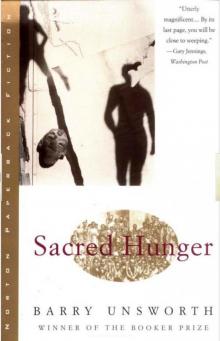 Sacred Hunger
Sacred Hunger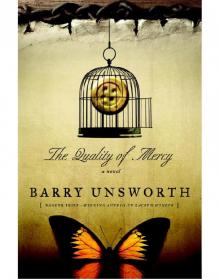 The Quality of Mercy: A Novel
The Quality of Mercy: A Novel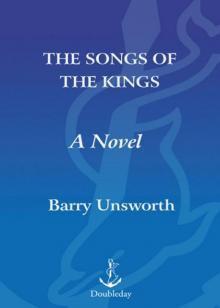 The Songs of the Kings: A Novel
The Songs of the Kings: A Novel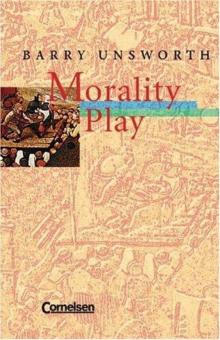 Morality Play. Mit Materialien. (Lernmaterialien)
Morality Play. Mit Materialien. (Lernmaterialien)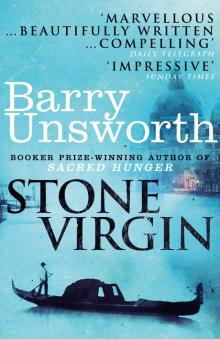 Stone Virgin
Stone Virgin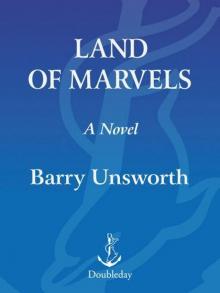 Land of Marvels
Land of Marvels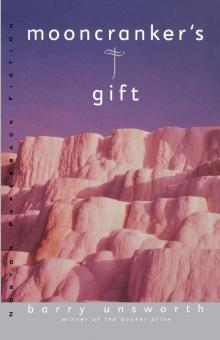 Mooncranker's Gift
Mooncranker's Gift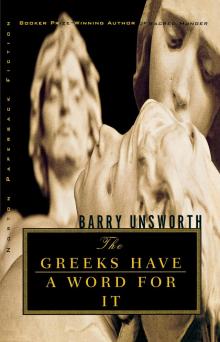 The Greeks Have a Word for It
The Greeks Have a Word for It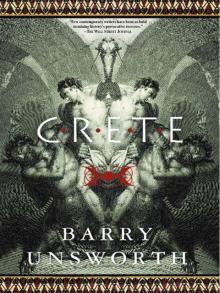 Crete
Crete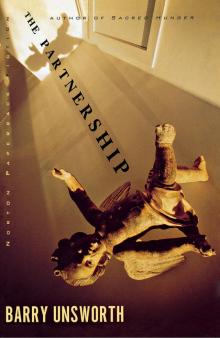 The Partnership
The Partnership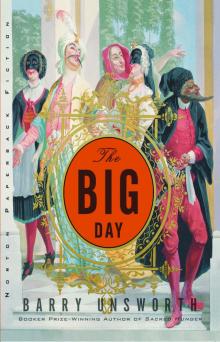 The Big Day
The Big Day The Hide
The Hide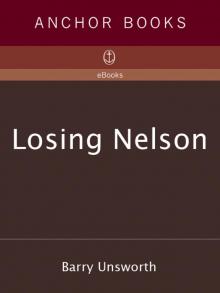 Losing Nelson
Losing Nelson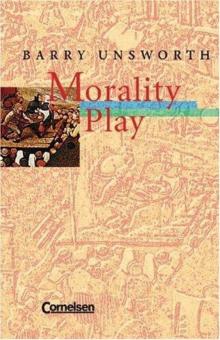 Morality Play
Morality Play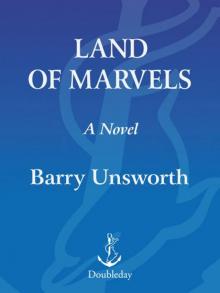 Land of Marvels: A Novel
Land of Marvels: A Novel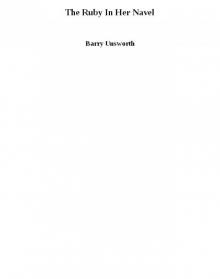 The Ruby In Her Navel
The Ruby In Her Navel